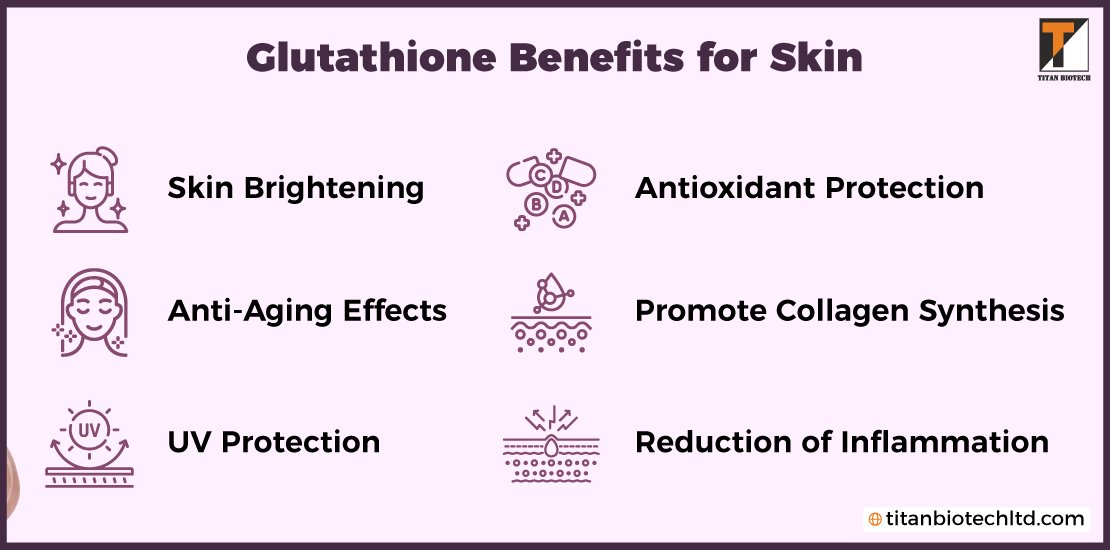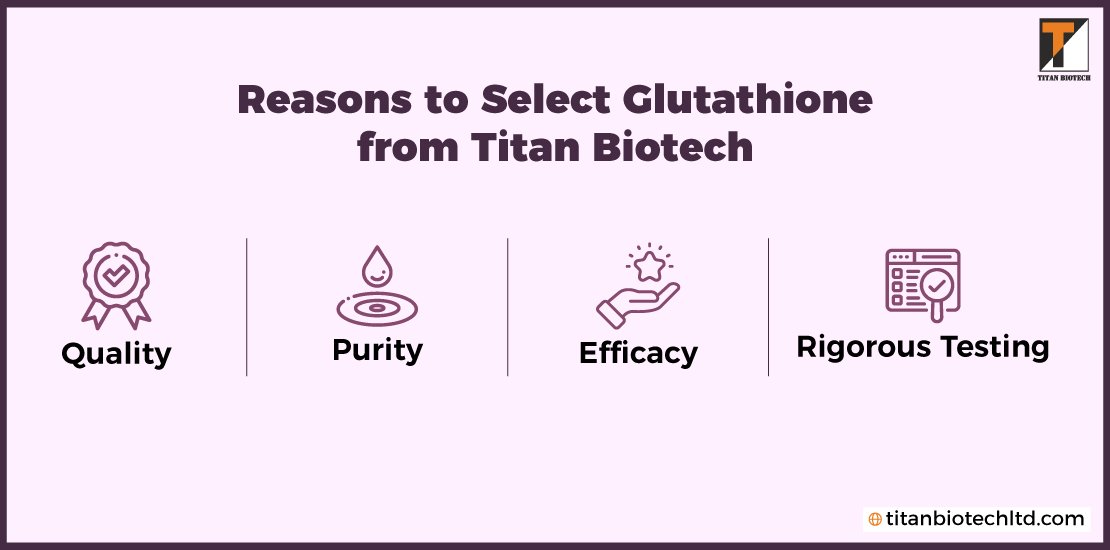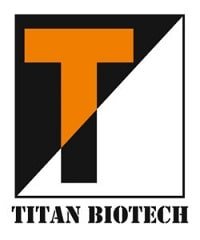Table of Content
- What is Glutathione, and How Does it Help Mitigate the Effects of Stress and Pollution on the Skin?
- What are the Skin Concerns Addressed by Glutathione?
- Glutathione Benefits for Skin
- Ways to Incorporate Glutathione in Skincare Regimen
- Reasons to Select Glutathione from Titan Biotech
- References
The impact of stress and environmental factors on skin health and beauty is significant, playing pivotal roles in the aging process and overall skin quality. Chronic stress has been associated with releasing stress hormones such as cortisol, contributing to oxidative stress and inflammation. These physiological responses can accelerate the aging of the skin by breaking down collagen and elastin, leading to the formation of wrinkles and fine lines. Moreover, stress can compromise the skin’s natural barrier function, making it more susceptible to environmental damage and dehydration.
Environmental factors, including exposure to ultraviolet (UV) radiation, pollution, and harsh weather conditions, also affect skin beauty. UV rays, in particular, can cause premature aging by triggering the production of free radicals, which damage cellular structures and DNA. This oxidative stress not only accelerates the formation of wrinkles but also increases the risk of skin cancer. Pollution, with its airborne particles and toxins, can lead to inflammation and a dull complexion, exacerbating skin conditions.
Additionally, environmental stressors can disrupt the skin’s moisture balance, leading to dryness, redness, and an overall lack of radiance. Over time, these combined effects of stress and environmental factors can result in a compromised skin barrier, decreased collagen production, and an overall loss of elasticity, contributing to a less vibrant and youthful appearance. Incorporating antioxidants such as glutathione helps to promote skin health and preserve beauty.
What is Glutathione, and How Does it Help Mitigate the Effects of Stress and Pollution on the Skin?
Glutathione is a small, low-molecular-weight, and water-soluble tripeptide. It is formed from three amino acids, viz. glutamate, cysteine, and glycine, and is present in two forms: reduced and oxidized. Reduced glutathione is more active and bioavailable.
Glutathione, a potent antioxidant, can mitigate the detrimental effects of stress and environmental factors on skin health and beauty. Glutathione helps reduce oxidative stress and inflammation, which are produced due to stress, UV exposure, and pollution. It slows down the breakdown of collagen and elastin, essential proteins for skin structure and elasticity, thereby preventing premature aging.
Another essential key role of glutathione for skin whitening is regulating melanin production by inhibiting the enzyme tyrosinase, which is involved in the synthesis of melanin, which may contribute to skin lightening. This property interests those seeking to address hyperpigmentation caused by UV exposure and other environmental factors.
Furthermore, the glutathione ingredient supports the body’s detoxification processes. It helps eliminate toxins and pollutants that can compromise skin health, creating a clearer complexion. As a result, glutathione’s antioxidant properties contribute to maintaining a healthy and vibrant skin tone.
What are the Skin Concerns Addressed by Glutathione?

Glutathione for skin addresses several concerns related to skin health and appearance. Some fundamental problems include:
- Wrinkles & Fine Lines- Wrinkles and fine lines are signs of aging caused by a gradual loss of skin elasticity and collagen.
- Hyperpigmentation- The overproduction of melanin leads to dark spots and uneven skin tone. The supplementation of ingredients in oral supplements works to inhibit melanin formation and promote a more uniform complexion.
- Collagen Production- Collagen, a crucial protein for skin structure and elasticity, diminishes with age.
- Environmental Toxins- Exposure to environmental toxins can contribute to premature aging and skin damage. Antioxidants like glutathione help neutralize free radicals, protecting the skin from environmental stressors and supporting natural detoxification processes.
- Acne and Blemishes- Acne and blemishes arise from excess oil production, inflammation, and bacterial growth.
- Sun Damage- Sun damage results from prolonged exposure to harmful UV rays, leading to premature aging, pigmentation changes, and an increased risk of skin cancer. An ingredient like glutathione helps prevent and minimize the effects of sun damage on the skin.
So, Glutathione is an incredible ingredient for improving skin pigmentation, whitening, reducing fine lines & wrinkles, minimizing the risk of sun damage, and boosting collagen synthesis.
Glutathione Benefits for Skin

Glutathione offers several potential benefits for the skin, making it a popular ingredient in skincare and wellness routine. Some of the critical advantages of glutathione for the skin are mentioned below:
-
Antioxidant Protection
Glutathione is a powerful antioxidant that helps neutralize free radicals in the skin. Free radicals can damage skin cells and contribute to aging, and glutathione’s antioxidant properties may help counteract these effects.
-
Anti-Aging Effects
It may contribute to a reduction in the appearance of wrinkles, fine lines, and other signs of aging by reducing oxidative stress and protecting against free radical damage.
-
Skin Brightening
Glutathione for skin pigmentation has been clinically studied for its potential to lighten and brighten the skin. It may inhibit melanin production, leading to a more even skin tone and a reduction in hyperpigmentation.
-
Collagen Synthesis
Glutathione plays a role in synthesizing collagen, a structural protein that provides elasticity to the skin. It supports collagen production and may contribute to firmer and more resilient skin.
-
Detoxification
Glutathione helps remove toxins and pollutants and can promote clearer and healthier-looking skin.
-
Reduction of Inflammation
The anti-inflammatory properties of glutathione may help reduce inflammation in the skin. It benefits individuals dealing with inflammatory skin conditions, such as acne.
-
UV Protection
Glutathione offers protection against UV radiation, helping to minimize sun damage to the skin.
Ways to Incorporate Glutathione in Skincare Regimen
There are several approaches to integrating glutathione into the skincare routine. A widely favored method involves oral supplements containing glutathione that exerts systemic effects. Another method, topical formulations, acts topically on the skin.
Oral supplements are more accessible to incorporate and more convenient than topical applications. It exerts systemic effects, benefiting organs and tissues throughout the body. The supplements are widely available and can be found in various forms, including capsules, tablets, and liquid formulations. Topical glutathione formulations primarily affect the skin locally and may not exert systemic benefits throughout the body.
The use of oral or topical glutathione depends on the requirements and advice of healthcare professionals. Various research studies have demonstrated that oral Glutathione for face benefits is safe to use without side effects. Also, it is well-tolerated, efficacious, and safe to use. The recommended dose of glutathione for skin whitening is 250 mg/ day.
Reasons to Select Glutathione from Titan Biotech

Titan Biotech’s Glutathione ingredient stands out from others in the market due to several vital differentiators highlighting its commitment to purity, efficacy, and quality control.
- Purity- The company ensures that the glutathione offered is of the highest standard, meeting the food industry’s strict purity and potency requirements.
- Efficacy- Glutathione ingredient is designed to be highly bioavailable, facilitating faster absorption by the body. This characteristic ensures that the glutathione is efficiently utilized, maximizing its benefits for the skin and overall health.
- Quality- Glutathione is free from harmful metals and biological contaminants. Rigorous quality control measures are implemented during manufacturing, adhering to international quality standards. The commitment to purity is crucial in maintaining the integrity of the glutathione product and ensuring its safety for use in various applications.
- Rigorous Testing- Titan Biotech conducts third party quality testing for affirming its quality. Independent labs worldwide test glutathione, providing an additional layer of verification for its quality and safety.
With over 30 years of experience in the industry, Titan Biotech brings a wealth of expertise to the table. This extensive experience contributes to the development of glutathione solutions that are not only scientifically sound but also practical and effective in meeting the diverse needs of their customers.
Finally, Titan Biotech offers customization options, tailoring glutathione solutions to meet specific requirements. This flexibility ensures that customers can access glutathione products that align precisely with their intended applications, providing a personalized and targeted approach to skincare and nutritional formulations. Overall, Titan Biotech’s Glutathione ingredient distinguishes itself through a combination of purity, efficacy, quality control, compatibility, expertise, and customization options, making it a reliable choice in the competitive market.
Titan Biotech is a leading manufacturer and supplier of biological products or raw material ingredient. We have the experience of 30+ years and supply a wide array of products across different sectors such as nutraceuticals, pharmaceuticals, food & beverages, nutricosmetics and animal feed industry. If you want to know more about Glutathione ingredient for skincare supplements or looking for supply of Glutathione in Bangladesh or Korea then you may contact us.
References
- https://www.ncbi.nlm.nih.gov/pmc/articles/PMC5413479/
- https://www.ncbi.nlm.nih.gov/pmc/articles/PMC7196133/
- https://pubmed.ncbi.nlm.nih.gov/33871071/

